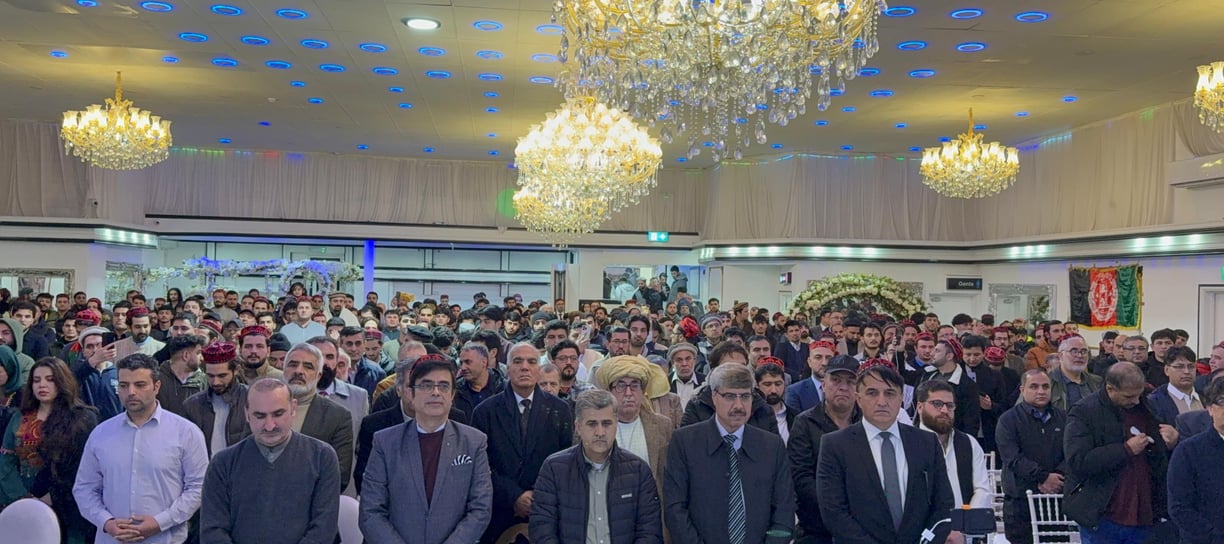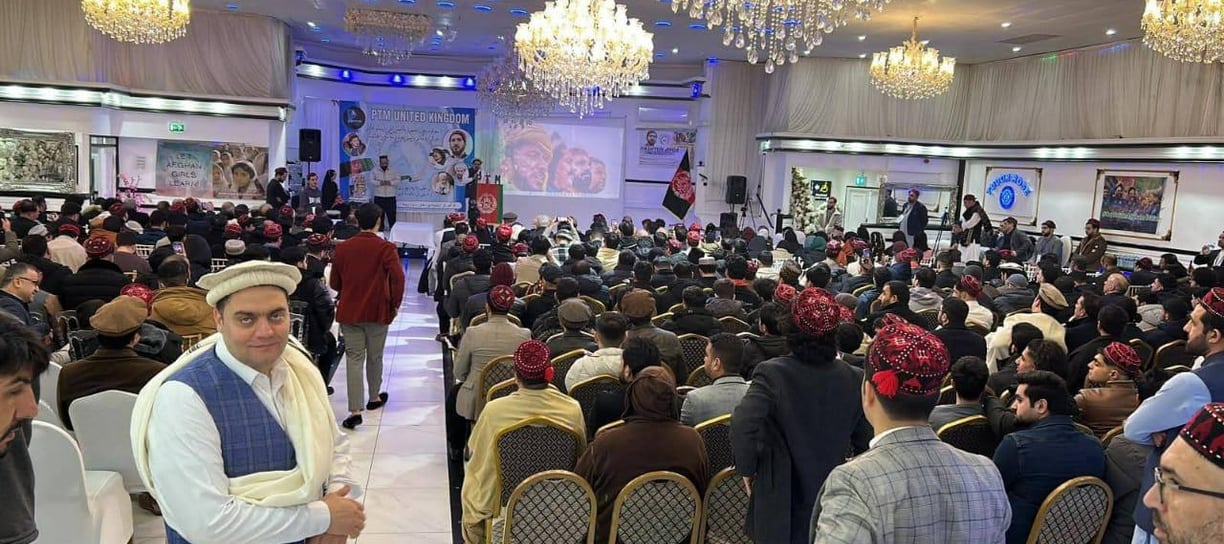PTM UK Hosts Grand Jirga to Support Pashtun Afghan Rights and Regional Unity
The Pashtun Tahafuz Movement (PTM) United Kingdom held a Grand Jirga in support of the resolutions of the Khyber Qaumi (National) Jirga, education of Afghan girls and the Afghanistan national cricket team. The Jirga was attended by political, cultural, and tribal leaders residing in Great Britain, as well as prominent women from political and cultural spheres. Additionally, PTM organizers and political figures from Europe, including PTM Europe Coordinator Malik Bazai, the head of the European Election Commission Siraj Babrakzai, the head of the European Discipline Committee Rahmanullah Momand, Central committee member Abdullah Ehsan, and PTM Belgium Head Waheed Sheerzad, also participated.
Representatives and members of PTM from various cities in United Kingdom, as well as from Belgium, the Netherlands, and Norway, attended the Jirga. Among the attendees the leader of the Free Balochistan Movement Hyrbyair Marri, Central Joint Secretary of the Baloch National Movement Hasan Dost Baloch, Information Secretary of Baloch Human Rights Council Dr. Khurshid Baloch, JM Sindh Movement President Sohail Abro, the leader of the Watan Party and former PTM representative Dr. Syed Alam Mehsud, the head of the Women's Human Rights Organization (Wak) and the former associate of the movement, Sana Ijaz, former Afghan diplomat in Islamabad Zardasht Shams, human rights defender Zar Ali Khan Afridi from Netherlands, and renowned journalists such as Dr. Dawood Janbaz, Spin Tani, Qasim Khan Mandokhail, Abdullah Miyakhel, Syed Abdullah Nizami, civil activists, and representatives and members of various organizations.
The leader of Pashtun Tahafuz Movement, Manzoor Pashteen, addressed the Jirga via video link from Pashtunkhwa, and his speech was warmly received by the attendees. Mr. Pashteen thanked the entire Afghan nation for their overwhelming support of the movement and the Pashtun Qaumi Jirga. He urged the nation to continue striving towards their goals through organized efforts in the future.
National leader Manzoor Ahmad Pashteen stated in his speech that Pakistan is a failed state and cannot be called a state. He criticized the failed judiciary, police, and every other institution. He mentioned that false cases are being fabricated against Ali Wazir, Malik Nasir Kokikhel, and Haji Samad Khan, and even cases of drug possession were filed against them while they were in jail.
The leader addressed the Punjabi establishment, saying that even if they impose ban on PTM in Pashtunkhwa and Pakistan but the Pashtuns and Afghans living abroad will continue to support the movement. He highlighted the numerous challenges faced by the Afghan nation, including the closure of all trade and transit routes along the Durand Line, leaving the people of Chaman and Angoor Adda stranded for months.
The leader also spoke about the closure of schools in their homeland and the lack of employment opportunities. He called on the current rulers in Kabul to reopen schools and provide job opportunities for their people. He assured that PTM and the Pashtun Qaumi Jirga will always stand with the Afghan people and will continue to raise their voice on international platforms.
The leader emphasized the unity of the Afghan nation, and all participants in the assembly pledged to remain united. Dr. Mohammad Qasim Ibrahim, the head of the Pashtun Tahafuz Movement in Great Britain, thanked all the participants for attending the Jirga and highlighted the significance of the event.
The Coordinator of PTM Europe Malik Bazai, thanked the representatives of the Baloch and Sindhi communities, as well as all the participants. In his speech, Malik Bazai stated that one of the significant achievements of the Pashtun Tahafuz Movement is that it has shaken the confidence of the Punjabi establishment. He mentioned that despite bombings and military operations, member of their community has been killed or injured by the Punjabi establishment.
The leader of the Free Balochistan Movement, Hyrbyair Marri, emphasized in his speech that the historical ties between Pashtuns and Baloch are not just based on blood but are rooted in shared history, culture, and values. He stated that Pashtuns and Baloch need to support each other against oppression and injustice, as this unity is essential for the freedom, justice, and stability of their region.
He further added that the colonial state of Pakistan has tried to sow seeds of division between Pashtuns and Baloch, but they must defeat these conspiracies. He said, "The relationship between Baloch and Pashtuns is not just a historical fact but a great asset for unity and progress. We must join hands, share each other's pain, and stand against any force that opposes our rights, freedom, and values."
Hyrbyair Marri also emphasised that victory against oppressive and colonial forces is only possible if we strengthen our mutual trust, unity, and support. He said, "Let us join hands for peace and progress and create a free, secure, and prosperous environment for our future generations."
At the end of his speech, he called on all Pashtuns and Baloch to accelerate their efforts to unite against oppression and continue their struggle with a unified goal. "We can only succeed when we see each other as brothers and rise together to defend our rights."
Dr. Ghafoor Lewal addressed the jirga via video link. Writer and researcher Shahswar Sangarwal provided valuable insights into the jirgas and the Durand Line.
The representatives of Angoor Adda sit-in, Sadar Rasool, and Chaman sit-in representative, Abdul Wali Mandokhail, spoke about the issues and challenges faced by millions of people living along the Durand Line.
Yalda Bazwan, member of the PTM leadership in Great Britain, spoke about the role of women in the movement, the education of girls, and the importance of women's rights.
The speeches of all the speakers can be found on PTM UK Twitter, PTM Updates Facebook, and YouTube. Thousands of supportive posts were shared on social media under the hashtag #PashtunJirgaUnitedKingdom, praising and reflecting on the Jirga.
This Jirga in Great Britain, like the jirgas in Germany and the United States, strongly supported the historic Khyber Jirga and its resolutions, considering them essential for the benefit and lasting stability of the entire Afghan homeland, from Amu to Abasin.




